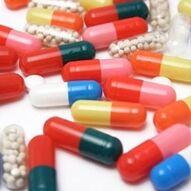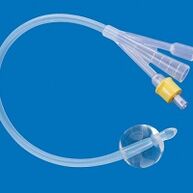
Prostatitis is the most common male urinary pathology in modern medicine.
Prostatitis in men can be caused by a bacterial infection or a man's lifestyle.
It is not worth starting the disease. In the first cases of urinary disorders, it is necessary to need a urologist, a comprehensive examination and accurate diagnosis.
Without proper treatment, prostatitis can lead to prostate cancer, which cannot be cured with medication.
The main groups of drugs for the treatment of prostatitis
The main groups of drugs for the treatment of prostatitis:
- With alpha blockers. . . Preparations with this active ingredient help to improve the tone of the detrusor, which significantly improves urination.
- With 5 alpha reductase inhibitors. . . Drugs of this group can reduce adenoma and relieve pain. Recommended in conjunction with physiotherapy procedures.
- Herbal anti-inflammatory drugs. . . They are quite effective, have a strong antiseptic effect and minimize side effects and contraindications.
Important!There are contraindications and side effects, so the self-purchase of the drug is not acceptable - the urologist should choose the drug and dosage.
Treatments for prostatitis with drugs
Patients may be prescribed:

- Rectal suppositories.Drugs that stimulate metabolism. The suppositories are injected in a supine position, after which they will rest for half an hour. The course of treatment can last up to ten days. Side effects such as allergic reactions or itching may occur.
- Injections.They stimulate the prostate gland, as well as strengthen the immune system and the vascular system. The doctor prescribes the drug by intramuscular injection. The course of treatment can last up to ten days. There are no obvious side effects.
- Infiltration.The doctor injects drugs through the urethra directly to the destination. Each injection should not exceed 5 ml of the mixture. Before the procedure, it is mandatory to empty the bladder.
- Expression.Solutions for enema are implemented on the basis of medicinal herbs. Enter the hot enema before going to bed. Basically, sage, Roman chamomile, wormwood, and honeysuckle are used for this. Not more than 100 ml of a hot solution is injected into the rectum.
- Medicine.Treatment of prostatitis involves the use of broad-spectrum antibacterial drugs. This is especially important when the pathogen has not been identified.
Important!Antibiotic therapy is used in the treatment of acute and bacterial prostatitis.
Rectal suppositories for the treatment of prostatitis
Suppositories used for rectal suppression are one of the effective remedies. They have a wide impact and have a positive effect on the affected area.
The most effective and commonly prescribed medications include:
- Candles with ichthyol. . . They have anesthetic and antiseptic effects, improve blood circulation. Often these suppositories are prescribed in combination with pills and physiotherapy. The candle does not have a very pleasant smell, but this does not affect the skin in any way. The drug is contraindicated with internal hemorrhoids and anal fissures.
- Candles with propolis. . . They have anti-inflammatory and analgesic effects when urinating. The drug has no contraindications (except in the case of individual intolerance to the components), so it is often used in preventive measures.
- Suppositories with indomethacin.They reduce swelling and inflammation, and normalize prostate activity. Used in advanced cases. The drug has contraindications, consultation of a doctor is required.
Injections to treat prostatitis
Modern medicine offers injectable preparations aimed at treating the prostate gland and strengthening the male immune system.
These drugs improve regeneration. Injectable drugs are used to treat or prevent conservation, protecting the prostate from the virus. The drug has contraindications, so only the doctor prescribes the dosage.
Penetrative

The method is based on administering the drug to the affected area.
This method allows you to completely eliminate the bacteria. Ozonized solution, an antiseptic, is used as medicine.
Important!The instillation procedure is only carried out in the doctor's office. Only he can choose the right medicine, insert the catheter into the urethra and do all the necessary manipulations to keep the solution inside.
The course of treatment lasts from 1 to 2 months, depending on the stage of the pathology.
The procedure is performed 2-4 times a week.
Drug treatment of prostatitis
Tablets, like candles, are divided into groups, depending on the action. The drug should only be prescribed by a urologist after complete examination, which will determine the stage of the disease.
Important!There are contraindications and side effects, so the self-purchase of the drug is not acceptable - the urologist should choose the drug and dosage.
Usually, drugs are prescribed:
- Anti-inflammatory. . . Used for acute prostatitis and pain during urination. The drug works to treat prostatitis, preventing the disease from becoming chronic.
- Antispasmodic drugs. . . A group of drugs that reduce spasm and relax muscles, significantly improve blood circulation.
- Antibiotics. . . Prescribed for bacterial prostatitis. Which antibiotic is prescribing is determined by the doctor conducting the examination. Antibiotics are taken in a course together with rectal suppositories.
Antibiotics to treat prostatitis

Let us take a more detailed look at the final class of drugs.
Fluoroquinolones are modern antimicrobials, developed relatively recently. They have many advantages over other broad spectrum antibiotics. Drugs in this group do not actually cause immunodeficiency. Fluoroquinolones have an even broader spectrum of effects on microorganisms.
Preparations of the tetracyclin group may also be used. Most often these funds are prescribed for infectious and chronic inflammatory prostatitis.
Antibacterial drugs are prescribed only after testing for infection. Until results are available, symptomatic therapy is performed with the aim of reducing pain and inflammation.
The course of antibiotic treatment lasts about a month, followed by clinical monitoring of the patient's condition.
Good results are obtained with complex therapy aimed at increasing the general and local resistance of the body to the pathogenic factors. Only in this case a complete recovery or long-term remission is possible.



























